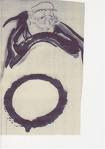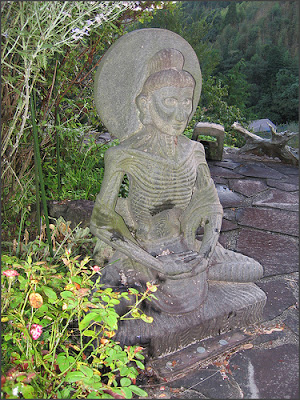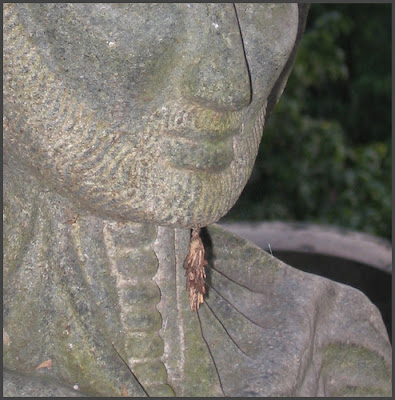empty mind ...
I wonder who is chatting
inside
My Japanese sensei used to say
Empty your heart and mind completely, and receive the haiku as a present into this emptiness.
You can not MAKE a good haiku happen, it has to make itself through your empty mind.
Do not try to be witty or poetic or "deep" or anything ... just let nature do the talking through you.
:::::::::::::::::::::::::::::::::::::::::::::::::::::::::::::::::::::::::::::::::::::::::::::::::::::
Selflessness
Bruce Ross
If affective perception determines much of haiku feeling, selfless perception often determines how haiku consciousness exists. For this reason Robert Spiess, the long-time editor of Modern Haiku, preferred the term "feeling" (senses centred on nature, aware) to "emotion" (very strong subjective feeling centred on non-rational mind) when discussing haiku poetics.
At the most basic level the personal "I" is usually left out of haiku. Basically, the personal "I", the Freudian ego and its mental constructs, let us say its emotion, gets in the way of the haiku experience. Empirical procedures and rational thinking that determine the Western mind also get in the way.
The Zen Buddhist idea of an empty mind, the openness to phenomenological presence, is suggestive of an appropriate mental climate.
A Zen saying explains the situation: "One thought follows another without interruption. But if you allow these thoughts to link up to a chain, you put yourself in bondage".
How does one not get bogged down in thought and experience haiku consciousness? A haiku by Kai Falkman offers a response:
the skier stops
to leave room
for the snow's silence
The first two lines of this poem describe the cessation of what Zen Buddhists call the "monkey mind", a continuous flow of thought. Enlightenment or clear mind, the present-tense clarity of perception, cannot occur when the monkey mind is present.
In effect one must clear one's mind to allow things to speak for themselves.
The phenomenological reduction, the skier stopping, accomplished, the snow, its silence, can speak for itself. Here the personal "I" is not used. The poet, his will, is not stopping the skis. The snow's silence is. The "I" is not what is important. What is important is the snow's silence. The stopping is a mere notation leading to the snow's silence. In many ways this poem becomes an evocation of a kind of enlightenment experience.
A monk asked Li-shan: "What is the meaning of Bodhidharma coming from the West?"
"There is no ‘what' here," said Li-shan.
"What is the reason??"
"Just because things are such as they are," replied Li-shan.
- Zen mondo
source : The Essence of Haiku
By Bruce Ross. autumn 2007
:::::::::::::::::::::::::::::::::::::::::::::::::::::::::::::::::::::::::::::::::::::::::::::::::::::
googeling at random
The Empty Mind is not just for martial artists, but for anyone who wishes to improve themselves both spiritually and physically
Amazon.com: The Empty Mind: Ueshiba Moriteru
The beginner’s mind is an open mind, an empty mind, a ready mind,
An Open Mind is not an Empty Mind.
Education's purpose is to replace an empty mind with an open one.
Empty Mind. Musings, observations, rantings and commentary by a libertarian Christian Zen Master.
Taoist Art. Learning to be free in the empty mind.
... an empty mind goes a long way toward ensuring a full pocketbook.
one of the basic things that individuals can do to improve the quality of their "thinking" is to have an empty mind.
MySpace profile for empty mind with pictures, videos, personal blog, interests, information about me and more.
Empty Mind gifts from the CartoonStock directory
:::::::::::::::::::::::::::::::::::::::::::::::::::::::::::::::::::::::::::::::::::::::::::::::::::::
ZEN KOAN METHOD
Empty your Mind and enter in tune with the Cosmic Mind
Lao Tzu Chapter 11
11.Usefulness of Emptiness
Empty your Mind
Thirty spokes are united in one hub (to make a wheel);
But the usefulness(the function) of the wheel depends on the empty space- the center hole of the hub.
Clay is molded into a vessel or a bowl
But it is the empty space within that makes it useful.
Doors and windows are cut out of the walls of a house,
But it is the empty (open) space inside that makes it useful (livable) .
Therefore take advantage of what exists (what the mind receives),
But use the emptiness (to open a way to enter in tune with the Cosmic Mind).
円相 ENSOO

:::::::::::::::::::::::::::::::::::::::::::::::::::::::::::::::::::::::::::::::::::::::::::::::::::::
frieden und freude
zerplatzen . . .
zen zen zen
. . . comments on facebook, 10/2010
:::::::::::::::::::::::::::::::::::::::::::::::::::::::::::::::::::::::::::::::::::::::::::::::::::::
. . . Read my Haiku Archives 2009
[ . BACK to DARUMA MUSEUM TOP . ]
:::::::::::::::::::::::::::::::::::::::::::::::::::::::::::::::::::::::::::::::::::::::::::::::::::























